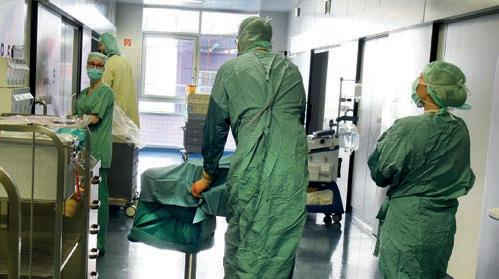©Reuters/Peter MacDiarmid
News brief Skills mismatch warning
Soundbites
More students are obtaining a higher education than ever before. In OECD countries, 44% of 25-34 year-olds in 2018 had done so, compared to 35% in 2008, according to Education at a Glance 2019. The returns to education are clear: as those who have completed higher education are more likely to find a job than those who only have finished high school and they earn more too. But are students graduating with the skills they need to find work today—and tomorrow? Some sectors in high demand can’t find workers with the right skills. Less than 15% of new students in bachelor’s programmes choose to study engineering, manufacturing and construction, while less than 5% study IT, despite these sectors having among the highest employment rates and earnings. Women are particularly under-represented, making up fewer than one in four entrants, on average, across OECD countries.
Our house is burning down and we’re blind to it.[…] Let us make sure that the 21st century does not become[…] the century of humanity’s crime against life itself.
See www.oecd.org/education
Fossil fuel support threatens climate action
New development standard to fight abuse
Government support for fossil fuel production and use is on the rise again, after a drop between 2013 and 2016, threatening efforts to curb greenhouse gas emissions and air pollution, and the transition to cleaner and cheaper energy. Support across 76 countries increased by 5% to $340 billion in 2017, according to a new OECD-IEA report.
The OECD’s Development Assistance Committee (DAC)—made up of 29 donor countries and the EU—has agreed on a comprehensive set of recommendations aimed at preventing sexual exploitation, abuse and harassment. National aid agencies will be able to apply the measures when working with civil society, charities, and other bodies running development programs or delivering humanitarian aid.
See www.oecd.org/fossil-fuels
Economy Real GDP growth in the OECD area slowed to 0.5% in the second quarter of 2019, compared with 0.6% in the previous quarter, according to provisional estimates. It slowed markedly in the UK, to -0.2% from 0.5% in the previous quarter, and in Germany, to -0.1% from 0.4%. It also decelerated more moderately in the US and Japan, to 0.5% and 0.4%, and more marginally in France and Italy, to 0.2% and 0.0%. GDP growth also slowed in the European Union and the euro area, to 0.2% compared with 0.5% and 0.4%, respectively, in the previous quarter. Year-on-year GDP growth for the
4
Former French president, Jacques Chirac, who died 26 September 2019, addressing the World Summit on Sustainable Development, 2 September 2002. See www.jacqueschirac-asso.fr This is all wrong. I shouldn’t be up here. I should be back in school on the other side of the ocean, yet you all come to us young people for hope. How dare you? Greta Thunberg at the UN Climate Summit, 23 September 2019, Washington Post That “greatness” that I have achieved is something that everybody has the ability to create and be. Really, any one of us has this power. Xiuhtezcatl Martinez, Indigenous rights and climate activist, artist, 28 August 2019, Landscape News
Working past 65 In the face of rapid population ageing, governments must promote more and better job opportunities for older workers, in order to protect living standards and the sustainability of public finances, according to a new OECD report. Working Better with Age projects that the number of older people (50+) who will need to be supported could reach 58 per 100 workers in 2050, on average in the OECD.
See www.oecd.org/development
See www.oecd.org/employment
OECD area slowed slightly compared with the previous quarter, to 1.6% from 1.7%. The US recorded the highest annual growth, at 2.3%, while Italy recorded the lowest, at 0.0%.
growth rates. In Japan and Italy, the CLIs continue to point to stabilising growth momentum.
The OECD’s composite leading indicators continue to anticipate easing growth momentum in the US and the euro area as a whole, particularly in Germany. The CLIs continue to signal stable growth momentum in the OECD area as a whole and in France and Canada. In the UK, for which large margins of error persist due to Brexit uncertainty, the assessment remains for stable growth momentum, albeit around historically low trend
OECD area inflation picked up to 2.1% in July 2019, from 2.0% in June, as annual inflation excluding food and energy increased to 2.3%, compared with 2.2% in June. Energy prices were flat, following the -0.2% decrease in June, while food price inflation slowed slightly to 2.1%, compared with 2.2% in June. The OECD unemployment rate was stable at 5.2% in July 2019. Across the OECD area, 33.3 million people were unemployed. The unemployment rate

















